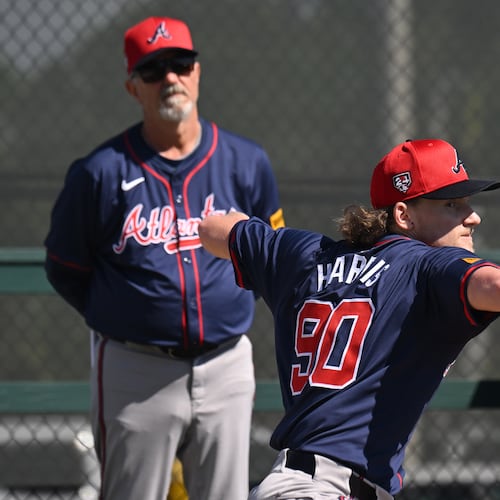Tyler Flowers signed an extension with the Braves on Tuesday, a “beyond perfect” situation, as he calls it, that was almost a decade in the making.
The Braves traded Flowers, a Roswell native, in 2008 as part of the Javier Vazquez deal. Still a minor league prospect, Flowers accepted he likely wouldn’t play for his childhood team.
“They didn’t want me, so I’ll never play there,” he said, recalling thoughts in the back of his mind. Flowers held no animosity. He debuted in 2009 and spent parts of seven seasons with the White Sox before being non-tendered before the 2016 season.
Before he and Chicago parted ways, Flowers was asked which teams he’d prefer. He had a list, but the franchise that drafted him wasn’t on it. Flowers recalled, “I rattled off a few other teams and didn’t get anything to happen out of that,” he said. “(The Braves) never crossed my mind.”
So nothing materialized, and Flowers was left pondering his future. When he was cut loose, the situation he never expected came to fruition.
“(The Braves) were the first team to call when I was non-tendered,” he said. “That’s when I realized this whole ‘childhood dream’ thing might actually happen.”
And so Flowers became a Brave, and two seasons later, he signed a one-year extension for $4 million, with a $6 million club option for 2020. He and the team had dialogue in spring, and when the Braves re-approached discussions a few days ago, it didn’t take long to reach an agreement.
The 32-year-old found where he belonged, even if it took eight years. He and his wife have enjoyed raising four children, none of whom are even 6 years old, back home – even if the team was stranded at the bottom of the standings.
Flowers endured the abuses of a major rebuild. He’s been given the task of handling pitchers from journeymen to 20-year-olds. He’s been through the transition to a new park, a new manager and an entirely new front office after an unprecedented scandal obliterated the infrastructure he knew.
The direction has since shifted, with the Braves sitting in first place in late August. It wouldn’t make sense to leave now, would it?
“Everybody’s who’s been a part of it the last couple years wants to be here for the next five,” Flowers said. “Because there are some good things happening right now. I think there’s going to be a lot of good things happening in the next couple years as well. So hopefully this will turn into a couple more at least and be part of something special.
“It’s pretty easy being at home with your home team, playing for the team you’ve always wanted to play for since you were a little kid. Any time they want me to come back again, I’m probably going to take it.”
The Braves have a $2 million buyout after 2019 if they so choose. Retaining Flowers is an important pre-winter footnote. He and Kurt Suzuki, who’ve shared catching duties the past two years, were on expiring deals.
As Flowers noted, he also avoids a free-agency process that was unkind to players last winter. The Bryce Harper and Manny Machado types will be rewarded, but questions persist if this market will be reminiscent of last, when teams and players simply couldn’t agree on value, resulting in long-standing free-agency stints for many. Some didn’t find deals until spring training or the regular season, if at all.
Given the Braves’ believed aspirations of landing a premier backstop, they will likely wait on Suzuki, who could certainly be awarded a starting job with another team. The Marlins’ J.T. Realmuto and Dodgers’ free agent Yasmani Grandal are frequently mentioned as catching targets, but the Braves may determine their resources are better spent elsewhere.
Flowers provides insurance if that’s the case, a necessary buffer with the team lacking depth in the upper minors. He’s accepting of a backup role, and if he became such, he’d be among the most handsomely compensated reserves in the sport. Either way, he’ll share the workload with another battery in 2019.
“I’m glad because if you lose a guy like that, you don’t know where you’re going to replace him,” manager Brian Snitker said. “There are not a whole lot of catchers out there who are available. We don’t have (depth), organizationally – Alex (Jackson) is close, but I don’t know if he’s ready for that yet. So it’s good to have Tyler under wraps.”
Since joining the Braves, Flowers has hit .264 with 25 homers and 110 RBIs across 243 games. He’s slashed .225/.357/.335 in 61 games this season. But his leadership, well-regarded pitch framing and how he handles young pitchers make his production transcend numbers.
“That’s something I’ve been pretty good at throughout the course of my career,” he said. “I’ve always valued that more than hitting .300 with 30 (homers). That’d be great to do one day, but wouldn’t want to do it sacrificing anything behind the plate. I think that was part of (the Braves’) thinking.”
The Braves are set for an active winter. They’ll have flexibility, both financially and with prospects, and motivation to be aggressive, unlike previous years. Securing Flowers early, and keeping his positive influence in an increasingly young clubhouse, seems to be an early victory.
“I felt like this was a very fair deal,” Flowers said. And it looks like the Braves agreed.
About the Author
Keep Reading
The Latest
Featured


